The first Pakistan Blockchain Summit took place at the Serena Hotel, Islamabad on January 18, 2022. The event was a collaboration between the BSV Blockchain Association and the Pakistan Ministry of Science and Technology, organised by Ejad Labs, and it hosted many government and business decision-makers at the physical venue, as well as a large online audience which viewed the live stream of the event.
Pakistan’s debut Blockchain Summit comprised a full day of presentations and discussions by international blockchain experts, fintech executives and government representatives, with topics of discussion revolving around the utility of blockchain technology and the BSV blockchain’s potential to solve challenges in enterprise and government.
The event was moderated by Maria Vovchok, a professional emcee and moderator at IT and blockchain conferences. Speakers and panellists included BSV Blockchain Association Founding President Jimmy Nguyen, Ejad Labs CEO Arzish Arzam, nChain Tech Lead Jad Wahab and Joint Director at the State Bank of Pakistan Attaullah Memon.
These high-profile speakers and many others discussed the future of blockchain technology and its importance for creating a Digital Pakistan – a new, more powerful digital version of the country that has the ability to empower all its citizens.
If you missed out on the Pakistan Blockchain Summit 2022, we have summarised the event below.
Blockchain for everyone, everywhere and everything – Jimmy Nguyen
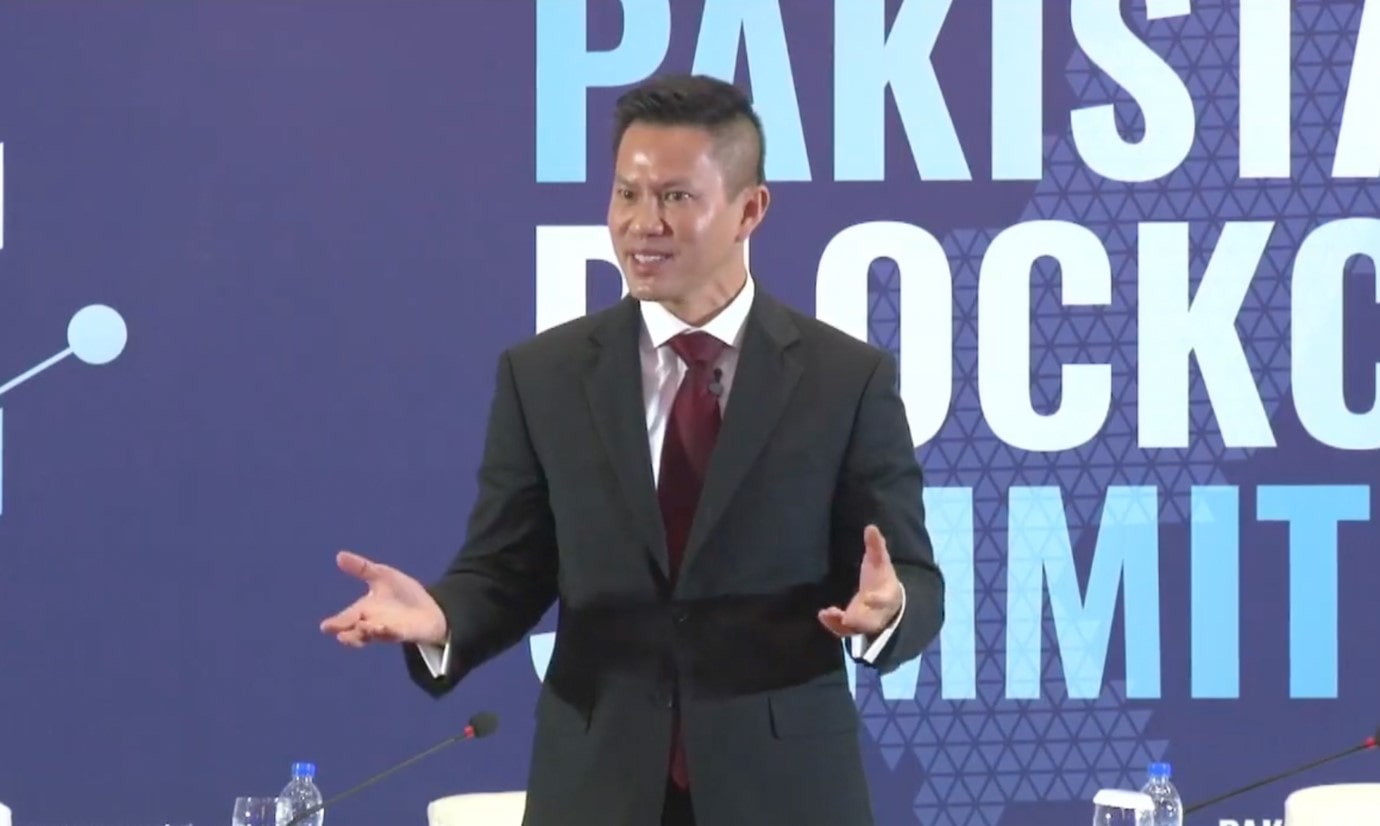
Following a brief introduction by Ejad Labs CEO Arzish Arzam, BSV Blockchain Association Founding Presiden Jimmy Nguyen took the stage to deliver the opening keynote. Nguyen opened by stressing the importance of the BSV blockchain’s ability to empower individual people and grant them sovereignty over their information.
He spoke about the BSV blockchain delegation’s meeting the previous day with His Excellency His Excellency Dr Arif Alvi, President of Pakistan, and lauded the President’s inclusive approach to the implementation of blockchain technology in government and the training of human resource in the country to meet the requirements of the Fourth Industrial Revolution.
‘Inclusion is important to make sure people of all socioeconomic levels, all genders, all backgrounds, have access to the benefits of blockchain technology. I’m here to tell you why BSV blockchain in particular, given its scaling power, is the blockchain for everyone, everywhere and everything,’ Nguyen said.
He explained the central ideas behind blockchain technology and its ability to revolutionise traditional data storage and management models, pointing out the incumbent issues with relying on centralised cloud storage providers and intermediaries. Speaking about the different blockchain infrastructure solutions available, Nguyen pointed out the lack of scaling and expensive transaction fees prevalent in most blockchain platforms and juxtaposed this deficiency with the unbounded scaling of BSV and its ultra-low transaction costs.
‘BSV is what a country, a big enterprise, developers who want to create consumer applications need if they want to create blockchain applications that work at scale, because it opens up many more opportunities,’ he said.
Nguyen also explained how the public nature of the BSV blockchain’s digital ledger engenders greater trust in government processes, ensuring that a newly digitised government system built on BSV would disincentivise corruption and improve public confidence.
‘If, for example, you are trying to count the votes of your next election, there is more public trust in the accuracy of the vote count. Therefore, we think it is the ideal blockchain for consumers, enterprises and government.’
Nguyen concluded his opening address by demonstrating the various use cases enabled by the BSV blockchain, from applications that empower consumers across socioeconomic levels to large-scale enterprise deployments.
Assuring enterprise data integrity with Kensei – Jad Wahab
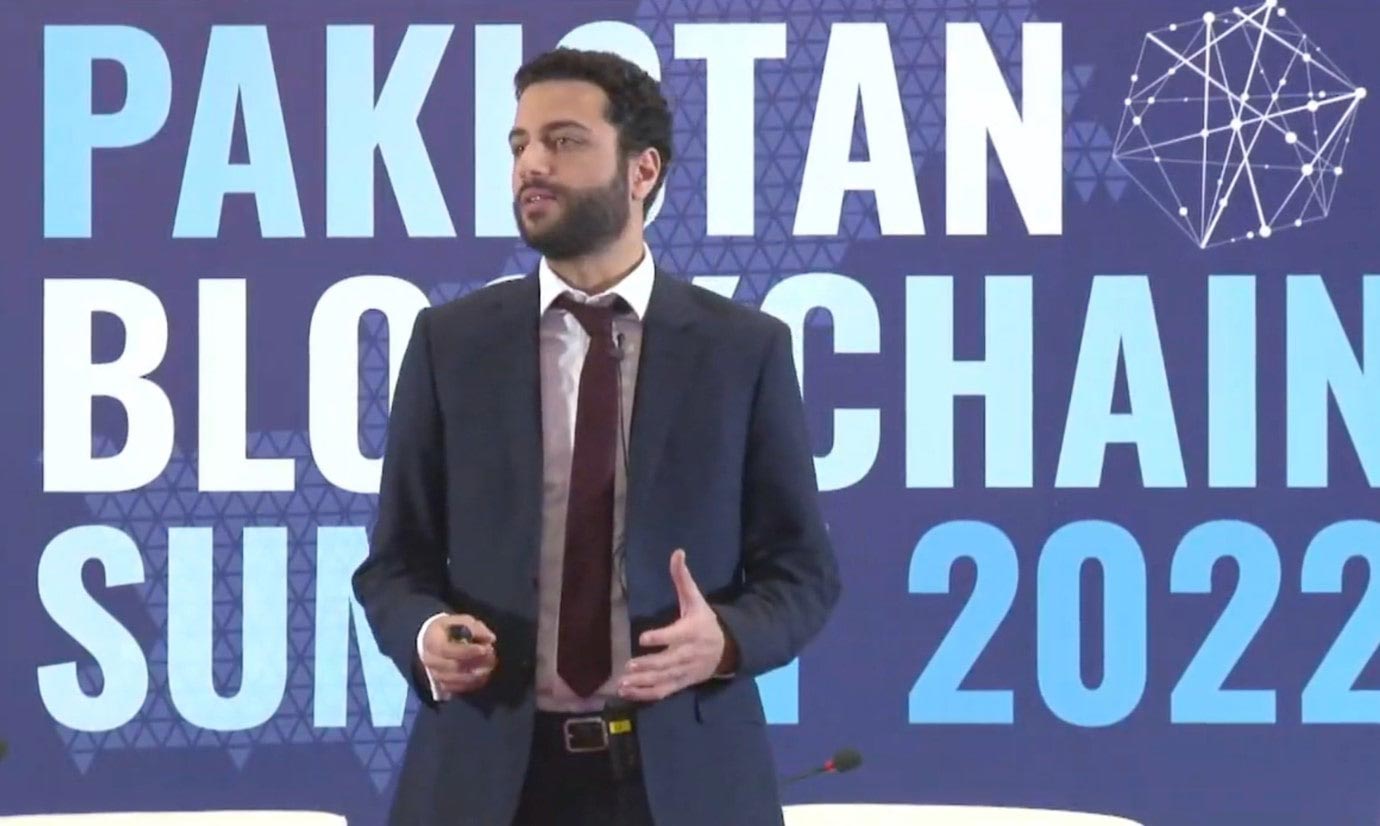
Next up, nChain Tech Lead Jad Wahab took the stage to present Kensei – a BSV-based platform targeted to enterprises which provides complete assurance of data integrity by leveraging the publicly auditable digital ledger of the BSV blockchain.
‘Kensei is an enterprise data integrity solution that we offer at nChain. We are trying to make the blockchain seamless and easily integrable – we want you to be able to leverage the power of the blockchain and the immutability aspect of that and make it as easy and simple as possible,’ he explained.
The immutability of data stored on the BSV blockchain makes it ideal for assuring data integrity, as it acts as a single source of truth that can provide certainty to whomever relies on that data that it has not been manipulated or altered. Wahab went on to describe the three different services – Certify, Connect and Compute – available to business through Kensei, each of which offers a deeper level of integration with the blockchain.
The design of Kensei is seamless and easily accessible via a set of clear and intuitive APIs, and the storage of data on the BSV blockchain ensures that once a business writes this data to the ledger, it remains secure and private.
‘Authorised parties can verify the integrity of the data. That does not mean that the data is public for everyone to see, in the same way on the Internet encryption and other privacy-enhancing technologies are used to ensure that only authorised parties can access that data,’ he said.
From the digital world to the Metaverse – Nael Shahbaz
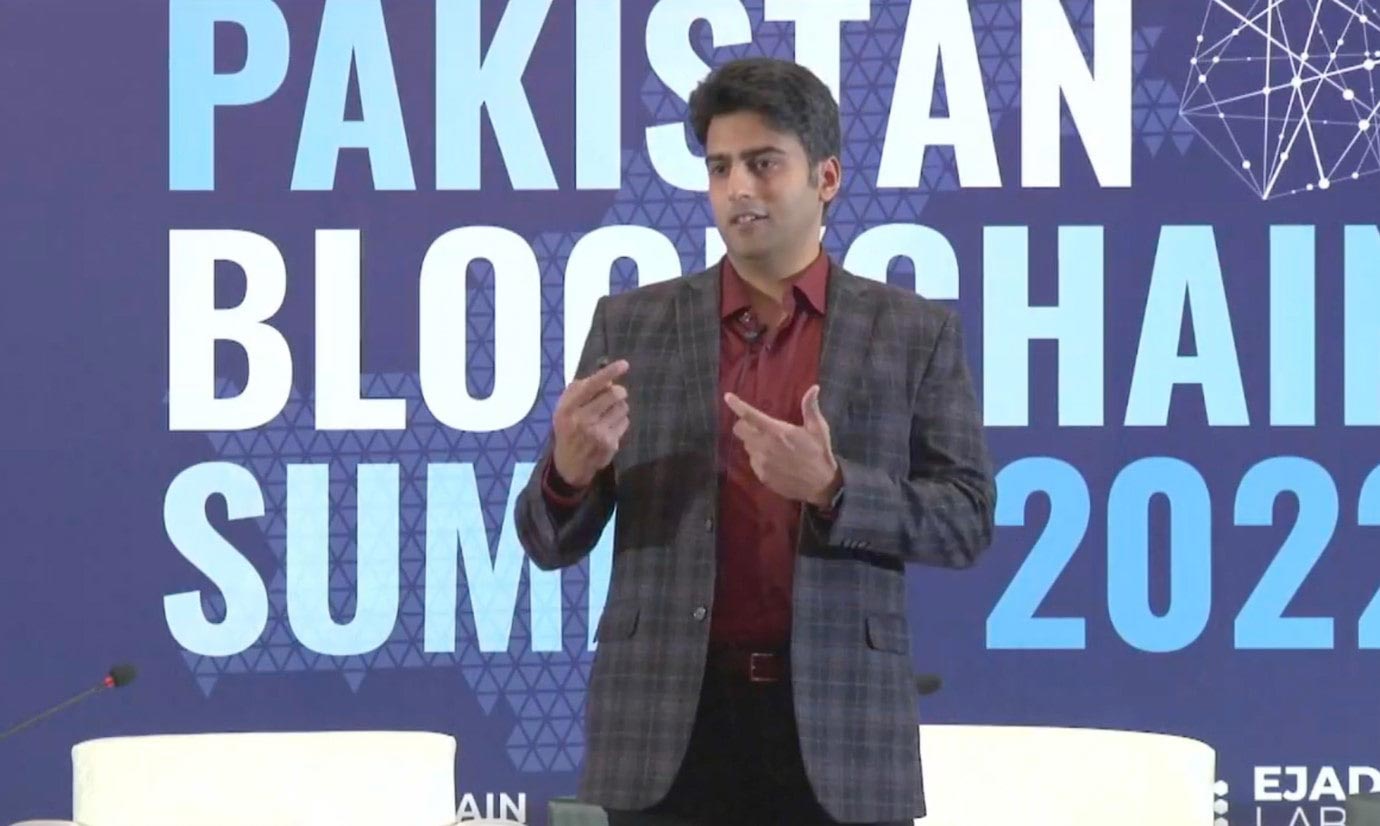
Following Wahab’s introduction to Kensei, InvoZone Head of Marketing Nael Shahbaz took the stage to speak about the Metaverse and the adaptability of blockchain applications.
Shahbaz began with defining the Metaverse and how this phenomenon can be harnessed by consumers and large-scale enterprises.
‘There is an entire ecosystem that is conducive to bring businesses – that is why it is self-sustaining. No-one needs to fuel it. It is interoperable, which means one Metaverse can be integrated with another, and it is decentralised. You could be designing a digital asset or an avatar and no-one is going to stop you,’ he said.
The concept of the Metaverse is something like a technological singularity, Shabaz noted, explaining how this idea existed far before Facebook opted to pivot its business strategy towards monetising virtual worlds. The integration of blockchain with the concept of the Metaverse is natural and inevitable, as the ability to offer data sovereignty and empower users in a digital world are concomitant with the mechanics of digital ledger technology.
‘There is no better platform for the Metaverse other than the blockchain,’ he said.
The BSV blockchain is especially suited for Metaverse applications and use cases, thanks to its ability to process a massive volume of transactions at an extremely low cost, while offering data provenance and immutability to the users and enterprises that build on it. BSV also includes extensive built-in smart contract capabilities, which enable it to facilitate the creation and trading of digital assets with unprecedented efficiency.
Panel Discussion – Blockchain and its applications
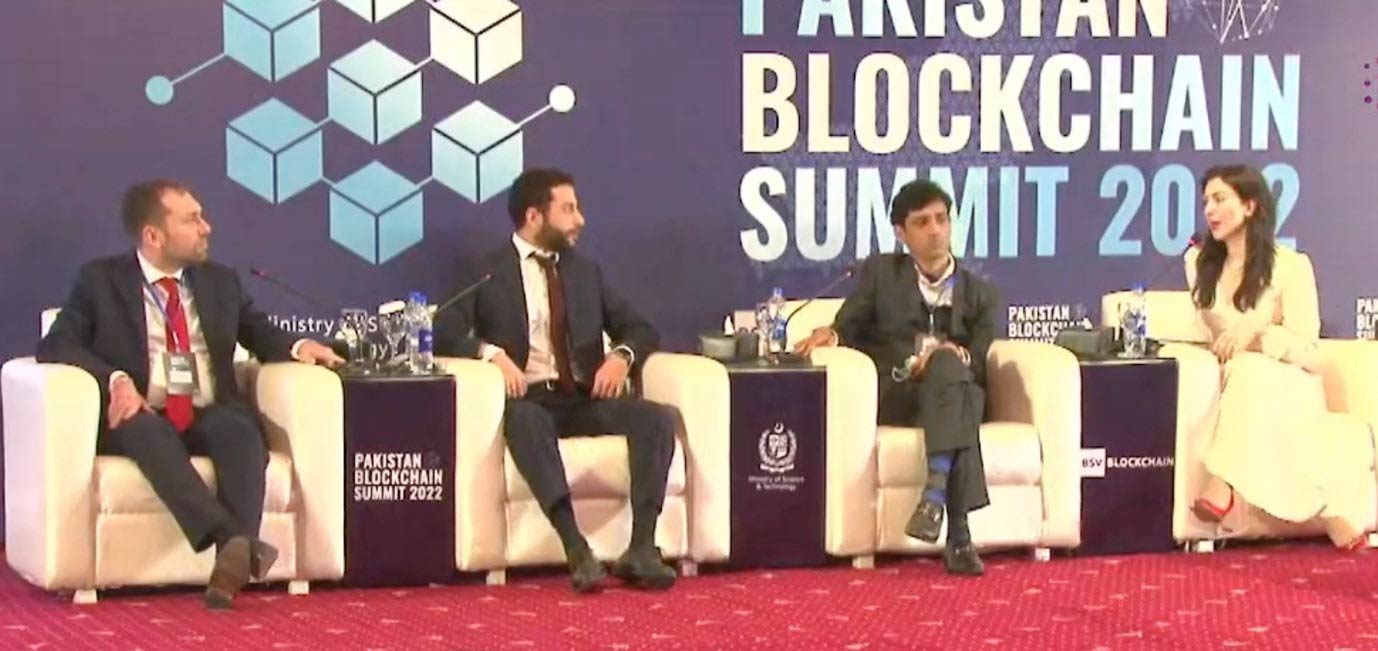
The next session was a panel discussion that focussed on the broad spectrum of blockchain applications, their benefits and the ramifications of worldwide blockchain implementations.
Maria Vovchok moderated the discussion, which included the following panellists:
- Dr Alessio Pagani – Researcher at nChain
- Jad Wahab – Tech Lead at nChain
- Mudassar Iqbal – CEO at The Hash
The discussion began with a discussion on the traits that are needed to succeed in business. Iqbal said that belief was key to succeeding in business, as well as the ability to learn continuously about the latest technologies.
‘If you don’t believe in anything, you won’t achieve anything,’ he said.
The discussion then moved on to the broad spectrum of blockchain applications already launched in the market across various industries, and the pace at which this number is growing.
Pagani noted that the understanding of blockchain technology is shifting towards utility and the realisation of practical use cases. He went through a number of these use cases, briefly highlighting the advantage of blockchain in many industries – include healthcare, supply chain management, finance, and identity management.
As the topic moved to secure asset transfer and management on the blockchain, Wahab explained the importance of implementing ideas at the right time, adding that the time is ripe for this type of use case as it is easy to integrate the blockchain on top of current processes and it does not require a significant network effect to be sustainable.
Tokenisation and Web 3.0 development – Rafael Schultz
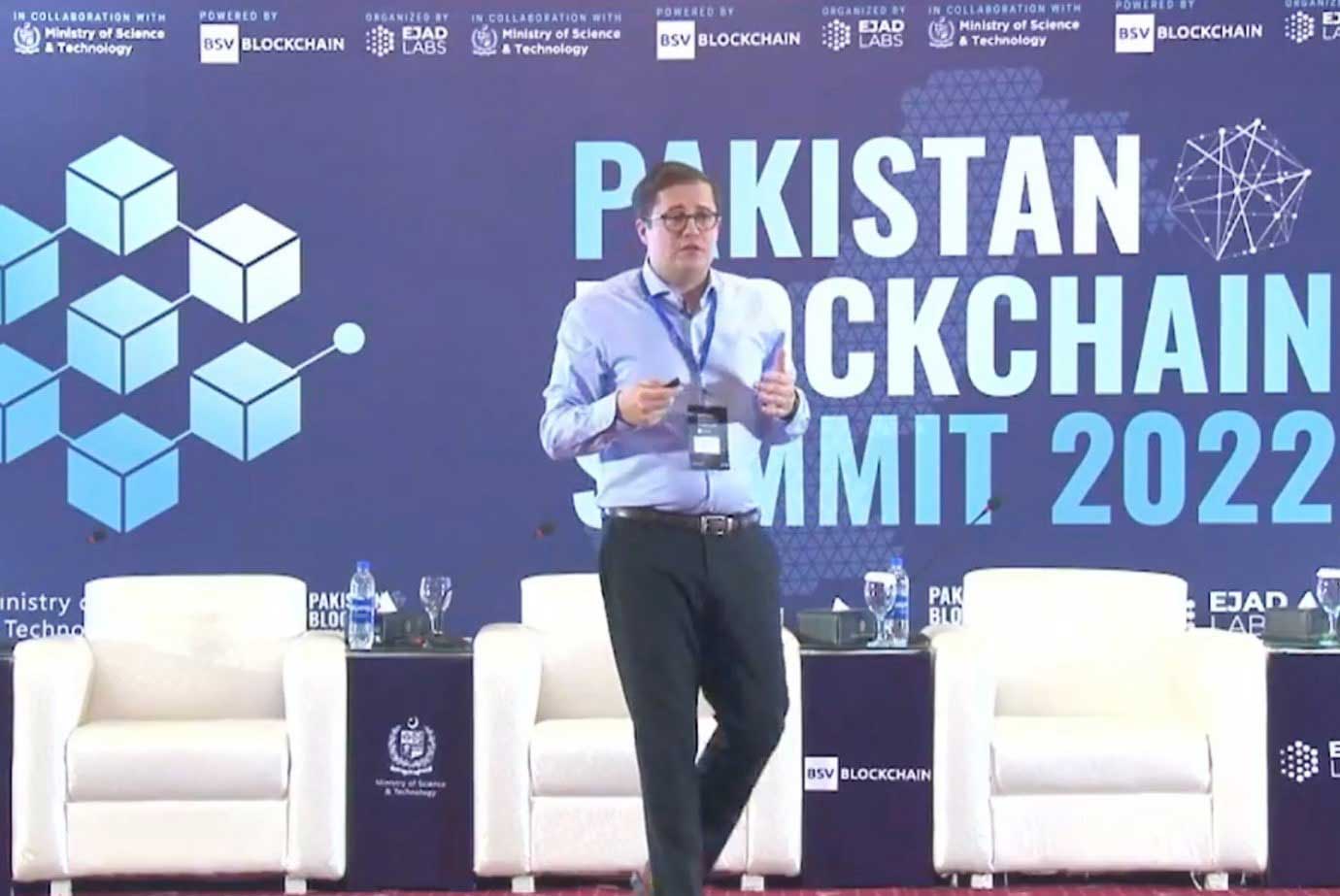
After brief break, the sessions resumed with a presentation by BCP Labs CEO Rafael Schultz.
Schultz spoke about the world of centralised finance and the disruption that will be created by the tokenisation of assets. He noted that the global asset market could grow exponentially as a result of tokenisation, as this makes assets more accessible to everyone.
He compared the processes behind decentralised and centralised finance and examined the processes behind DeFi start-ups as well as those used by traditional banks. The world of finance is beginning to adopt tokenisation and use blockchain technology as an instrument for empowering everyone from enterprise to consumer investors.
Regulation is adapting quickly to accommodate the explosion of digital asset projects, too, with Schultz explaining how incoming regulation in Europe will enable digital assets to be traded on traditional markets with an assurance of security. He also looked at how to transfer this approach to Pakistan.
‘I think we should take the smallest, easiest step first. Let’s challenge to create security tokens in Pakistan, for you, for the entrepreneurs and the national bank. Tokens for securities are the same as what happened to letters with email – we get rid of an intermediary,’ he said.
Panel Discussion – Powering next-gen financial services
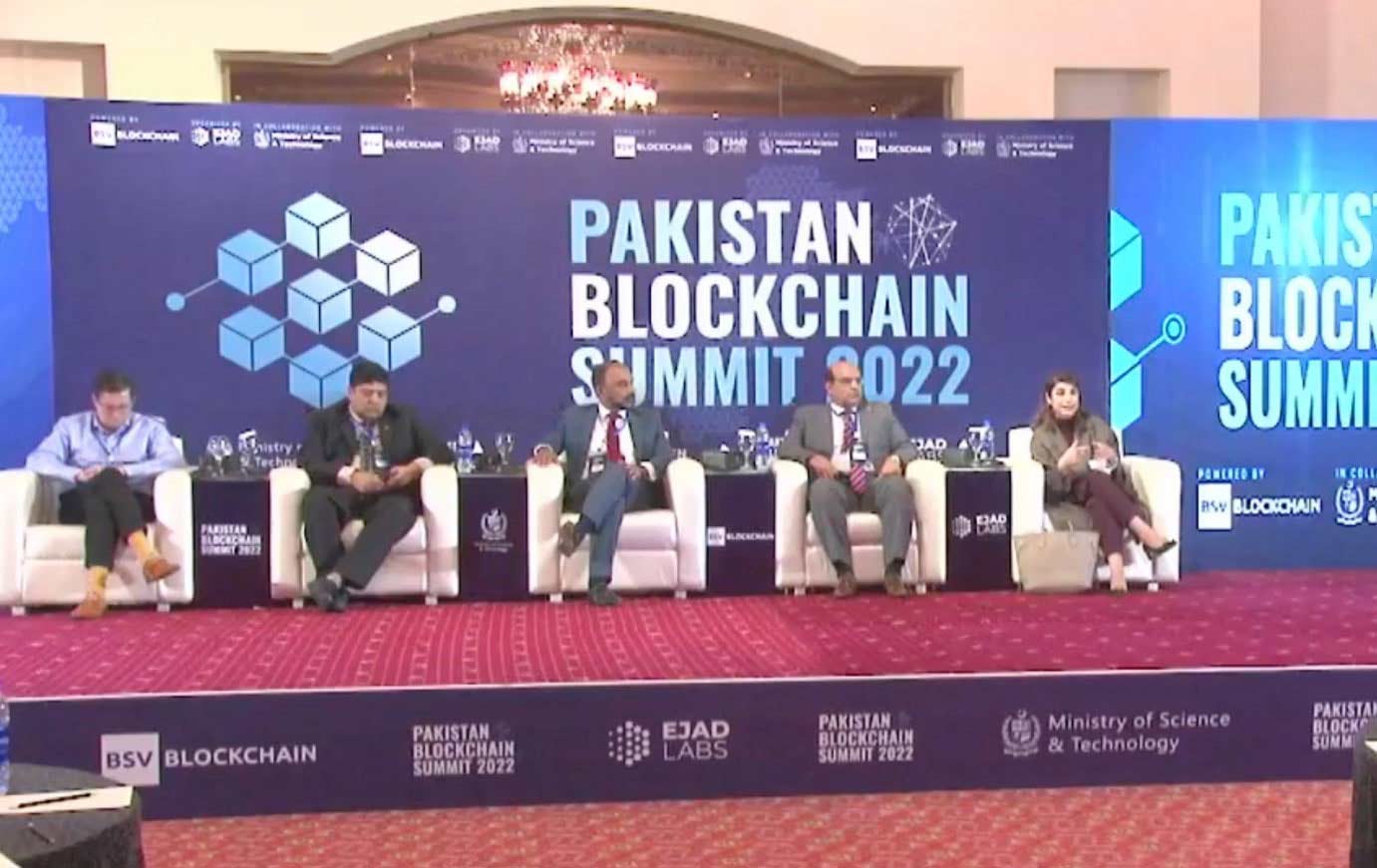
The next session saw Jimmy Nguyen return to the stage to moderate a panel discussion on the topic of blockchain’s potential to power the next generation of financial services.
The panellists who partook in this discussion were as follows:
- Rafael Schultz – CEO, BCP Labs – Germany
- Attaullah Memon – Joint Director at State Bank of Pakistan
- Fatima Akhtar – Director of Government Relations and Policy at Careem
- Muhammad Zeeshan Abid – Senior Partner Parker Russel
- Mohsin Jamil – Partner at KPMG
Speakers began by introducing themselves, their professional backgrounds and their involvement with blockchain technology before moving on to the first topic of discussion – how blockchain technology can make financial systems more efficient in Pakistan.
Akhtar began by explaining Careem’s plan to launch a digital payments ledger in the near future, as well as their approach to evaluating blockchain solutions.
‘The impact this technology is going to have on certain verticals and from a regulatory standpoint, I think we need to have those frameworks very clear as well. It is important to put those pieces in place as we start talking about how we can embed more use cases for blockchain,’ she said.
Abid contextualised the financial deficits and challenges faced by Pakistan, noting this makes for an excellent use case for the implementation of blockchain technology to improve the efficiency of financial systems in the country.
Memon also discussed the importance of regulation in making the adoption of blockchain technology more accessible, stating that it is important to education policymakers and improve their confidence in the data security of the blockchain.
Panel Discussion – Blockchain for good governance, sustainability and innovation
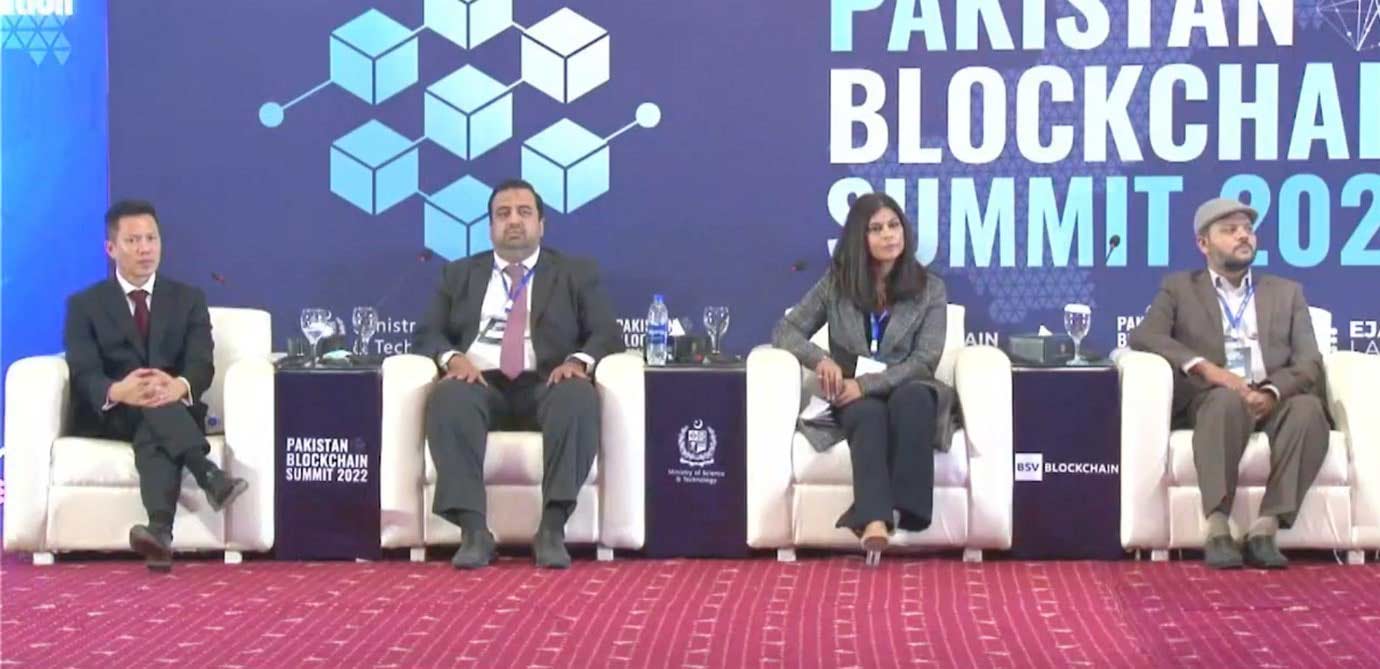
The next panel discussion focussed on the governance, sustainability and innovation problems that can be solved by blockchain technology.
Muhammad Salman Anjum, Head of BSV Hub for MENA and South Asia and Chief Executive of InvoiceMate, chaired the panel, which featured the following speakers:
- Sabina Zafar – VP Oracle
- Abdul Rahim Ahmad – CIO Special Technology Zones Authority: STZA
- Jimmy Nguyen – Founding President, BSV Blockchain Association
- Usman Salahudin – Tech Lead BSV MENA Hub & InvoiceMate
After an introduction from each speaker, they began to address the topic of the prospects for blockchain integration with government operations.
Nguyen advised that governments should use a staged approach to move a contained set of data to a blockchain solution before attempting to migrate their entire system, as this will provide measurable results in efficiency and improve trust in the technology.
Ahmad also spoke about the regulation in Pakistan that factored into the rapid adoption of blockchain technology, stating he was confident that these changes could move in staged implementations but that changes were required.
Zafar spoke about the difficulty in educating the government around the benefits of blockchain technology, citing the obstacles created by the disparate data sets of each state government in the United States of America. She also stressed the need for blockchain not to be politicised and the difficulty in navigating the conversation around government data management and storage.
Enabling digital transformation with BSV blockchain – Muhammad Salman Anjum
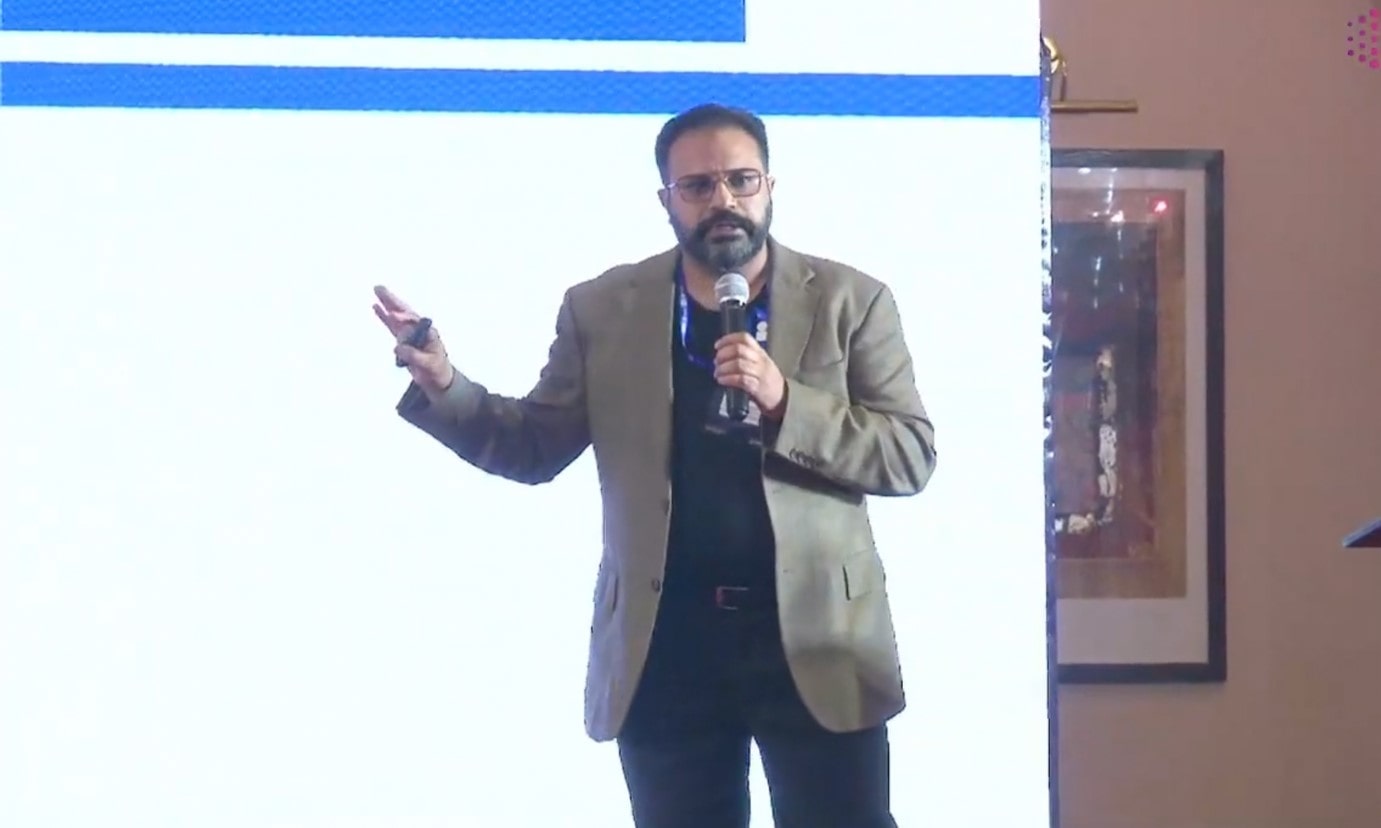
Next up, Anjum remained on stage to speak about the ability for the BSV blockchain to enable digital transformation in both the enterprise and government spaces.
Anjum’s presentation aimed to provide a roadmap for blockchain adoption as part of a government or enterprise digital transformation initiative. He provided a roadmap towards the implementation of a blockchain technology for business or government systems, noting the considerations that need to be appraised by decision-makers throughout this process.
He added that decision-makers should focus on a business problem rather than focusing on implementing blockchain technology for its own sake.
‘Blockchain is not a solution for everything,’ he said. ‘Blockchain is not a problem looking for a solution, it is a solution looking for different problems.’
Anjum also explored the capabilities of the BSV blockchain and its utility for both governments and enterprise thanks to its key features: public availability, transparency and auditability, immutability, fast and low-cost transactions, and privacy with traceability.
Fireside Chat – Mian Muhammad Ateeq Shaikh
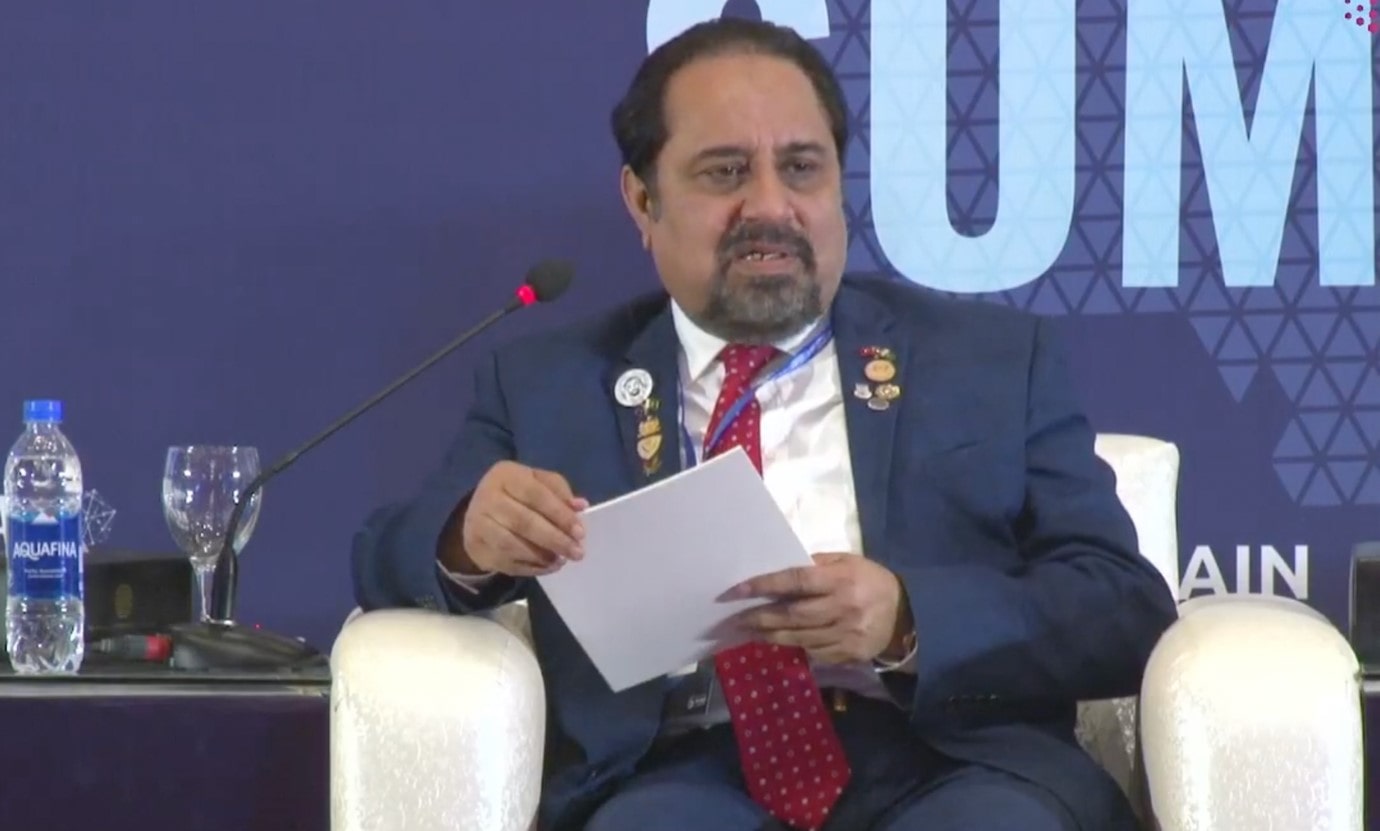
After the lunch break, Jimmy Nguyen was joined on stage by Mian Muhammad Ateeq Shaikh, Senator of Pakistan and CEO at Shalimar Group of Companies, for a fireside chat about blockchain technology and its applications in government.
Shaikh explained his deep interest in technology and the initiatives he has spearheaded to improve the education and adoption of cutting-edge technologies within the government of Pakistan. Shaikh quickly earned the moniker of the ‘digital senator’ among his peers for his efforts in furthering and fleshing out the idea of a digital Pakistan.
Nguyen and Shaikh discussed how Pakistan can develop its policy towards the fostering of blockchain development talent and the adoption of services built on cutting-edge technology.
‘My strong viewpoint is that we should not stop any activity or application – we should make the laws and rules to regulate them,’ he said.
‘We need [a national blockchain strategy]. Many of the problems we have right now… the solution for all of that is blockchain. After having today’s session, I’m really convinced even more.’
Shaikh described how he has convinced his colleagues of the importance of adopting policies that are friendly towards cutting-edge technologies and the need to work with different ministries to realise this goal.
QisstPay – Jordan Olivas
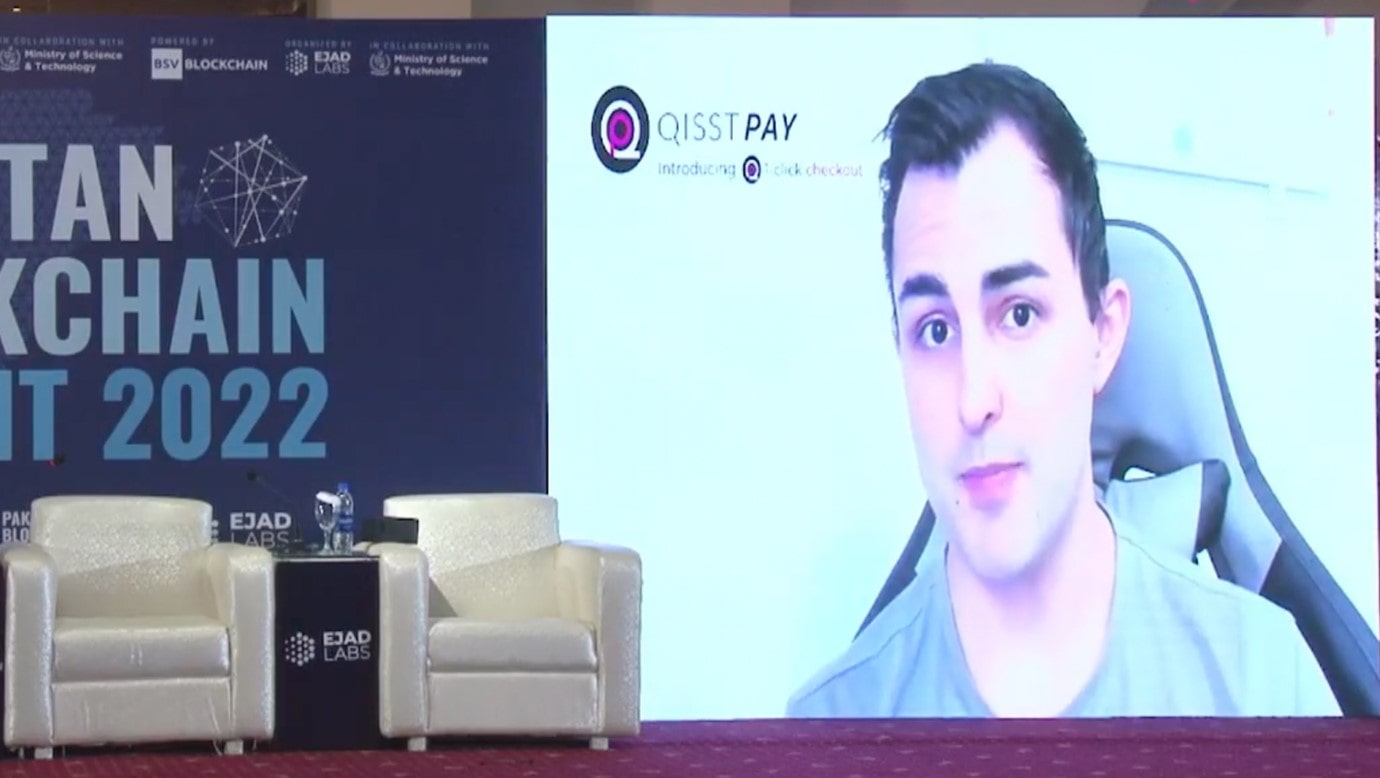
Following the fireside chat, QisstPay Co-founder and CEO Jordan Olivas delivered a remote presentation on the importance of the BSV blockchain for facilitating fast and cheap payments. He opened by explaining his relationship and perception of blockchain technology and his excitement at its various use cases.
‘I founded the company QisstPay, which is most popular primarily with retailers for our buy now, pay later solution. However, one of my passions is blockchain. A lot of people automatically relate blockchain to cryptocurrency because cryptocurrency uses blockchain technology. For me, I love the use cases behind blockchain.’
He noted the many problems prevalent with current financial and identification systems that could be rectified by blockchain technology, adding that he supports any blockchain technology that realises these use cases and delivers solutions to the many issues incumbent in traditional financial systems.
‘Companies like QisstPay, companies all over the world, are looking at blockchain as a way to better secure their data and better secure their consumer’s privacy.’
‘In addition, cryptocurrency eventually will become more mainstream, but for the time being it’s important to understand why people may want to be for it, why they may want to be against it, and for all of us to come to the table and try to find a way to make a ubiquitous decision on how to move this technology and this industry forward,’ he said.
Panel Discussion – Blockchain for education, supply chain and media
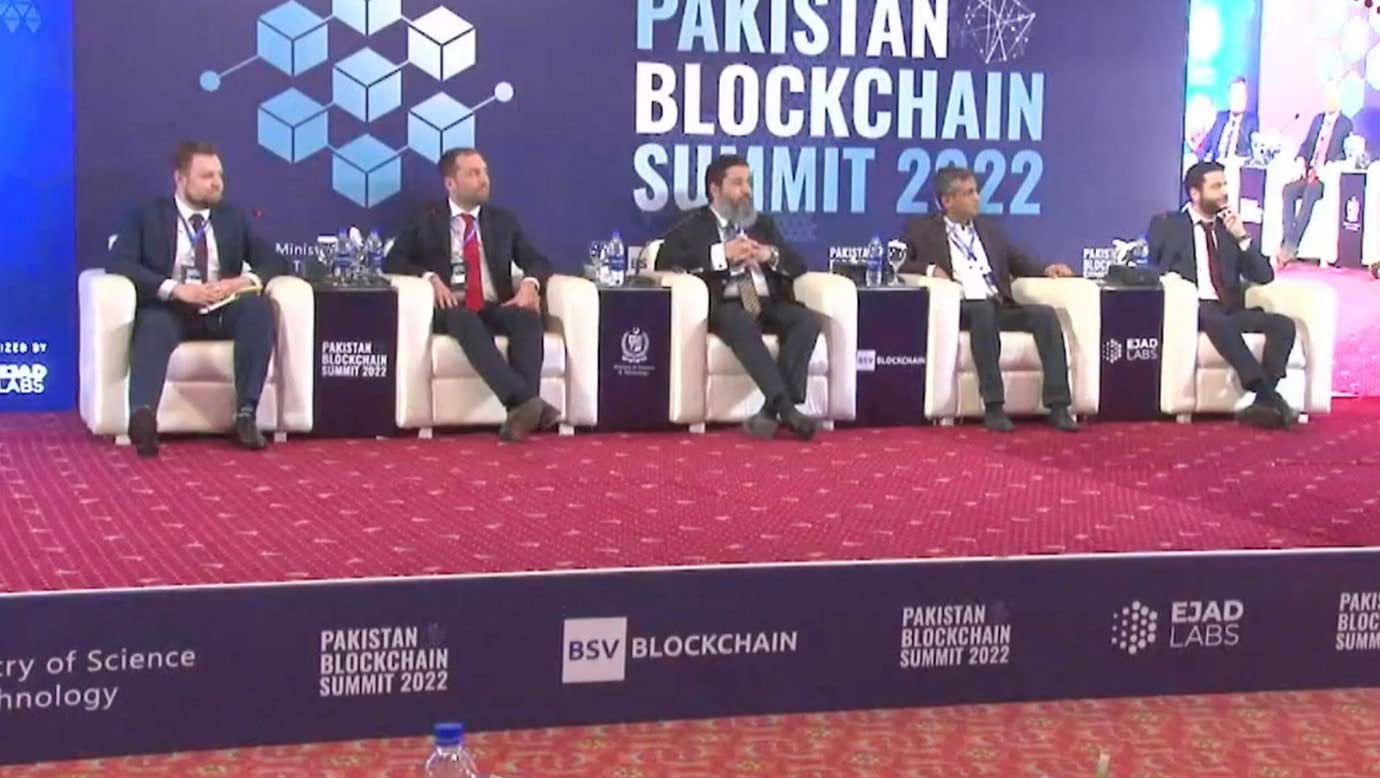
The next session saw Shehab Farrukh Niazi, Founder of Start-up Guide Magazine, take the stage to moderate a panel discussion on how blockchain can solve problems in the education, supply chain and media sectors.
Panellists comprised the following speakers:
- Greg Hall – Head of Content for BSV Blockchain Association
- Dr. Alessio Pagani – Researcher at nChain
- Salman Arain – Co Founder Fundaiq.com
- Ahmed Hamdan – Principal Consultant – Decrypted Solutions
- Jad Wahab – Tech Lead nChain
The discussion began with an exploration of interesting use cases, with each panellist diving into what interested them most about the potential the technology has to disrupt existing business models or create new ones.
Speaking from his experience as a journalist, Hall spoke about the important ramifications for blockchain on the reliability of information, stating that an auditable and immutable digital ledger could address the implicit need for reporters to trust fallible sources of information, which brings an element of risk and the potential for misinformation to spread.
Panellists also spoke about the utility of blockchain within the supply chain space. Pagani stressed the importance of reliable and auditable data in this conversation, noting that a public record of data provenance that is reliable and secure is crucial to removing inefficiencies in the supply chain industry.
Arain echoed the importance of data reliability, framing the importance of collaboration within Pakistan to elevate people and improve their education and socioeconomic conditions as a crucial cornerstone to a strategy that enables a digital Pakistan.
Panel Discussion – Curious cases of blockchain in Pakistan
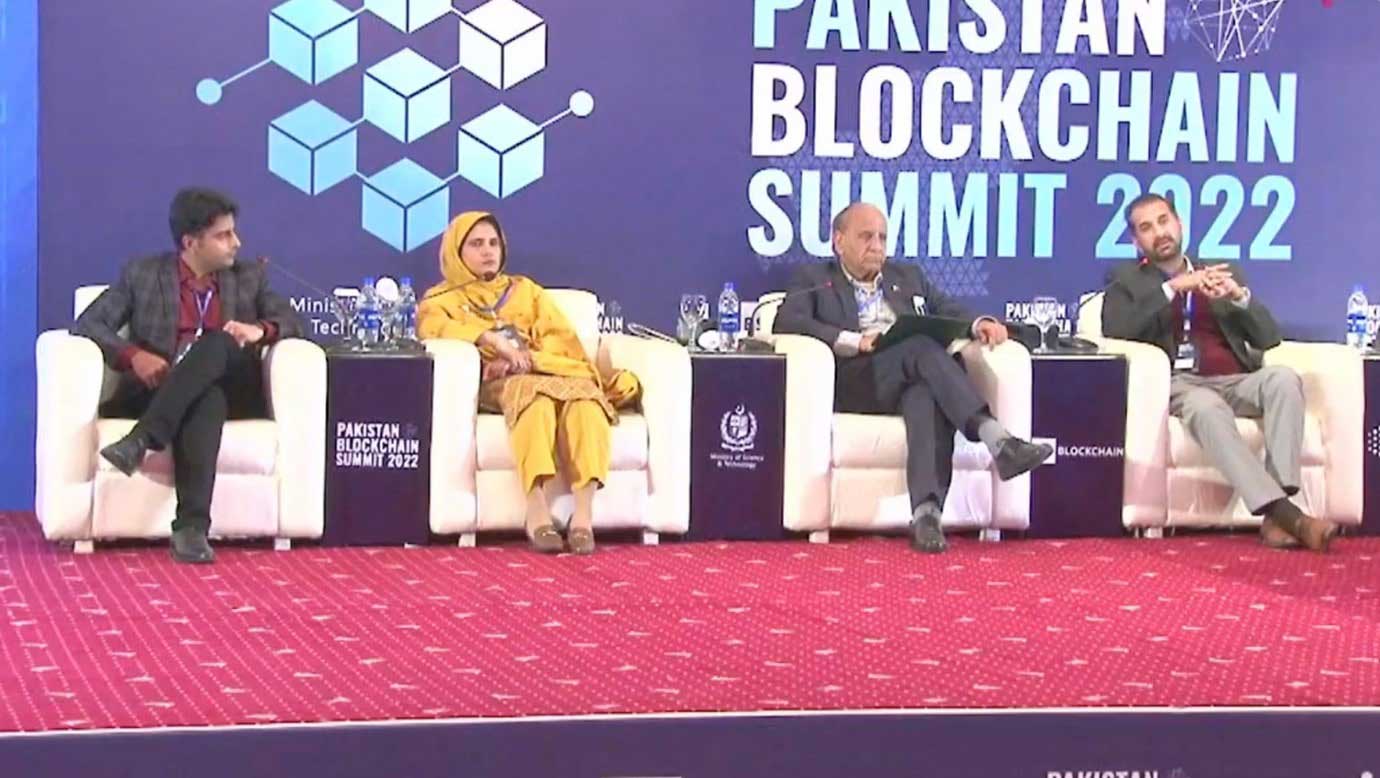
The last panel discussion of the day saw Muhammad Salman Anjum return to the stage to moderate a session exploring the potential use cases for blockchain technology in Pakistan.
The panellists for this discussion were as follows:
- Nael Shahbaz – InvoZone Head of Marketing
- Ammar Jafri – Chairman Pakistan Blockchain Association
- Najia Ubaid – Additional Director and HOD at SECP
- Dr Fawad Khan – Assistant Professor at Ghulam Ishaq Khan Institute
The discussion began with the challenges Pakistan faces in adopting blockchain technology as part of its digital migration project. Ubaid began by pointing out the importance of government involvement in driving the adoption of cutting-edge technology like blockchain, through instruments such as policy or regulation changes.
Panellists also spoke about the mainstream perception of cryptocurrency as an instrument for risky investment and how this must be separated from the applications and services being built on blockchain technology that have real utility for businesses in Pakistan and the country’s government.
Jafri highlighted the demand for use cases of blockchain technology that could help to improve the economic environment in Pakistan, which faces a serious challenge that endangers the quality of education and the country’s job market. He said that people need to come together to address these challenges and find use cases which would allow blockchain technology to help surmount this problem.
The session closed with speakers proposing pertinent use cases relevant to Pakistan, as well as a discussion on the need to educate students about blockchain technology and the demand for resources and human capital to train up the next generation of blockchain developers in Pakistan.
Closing remarks
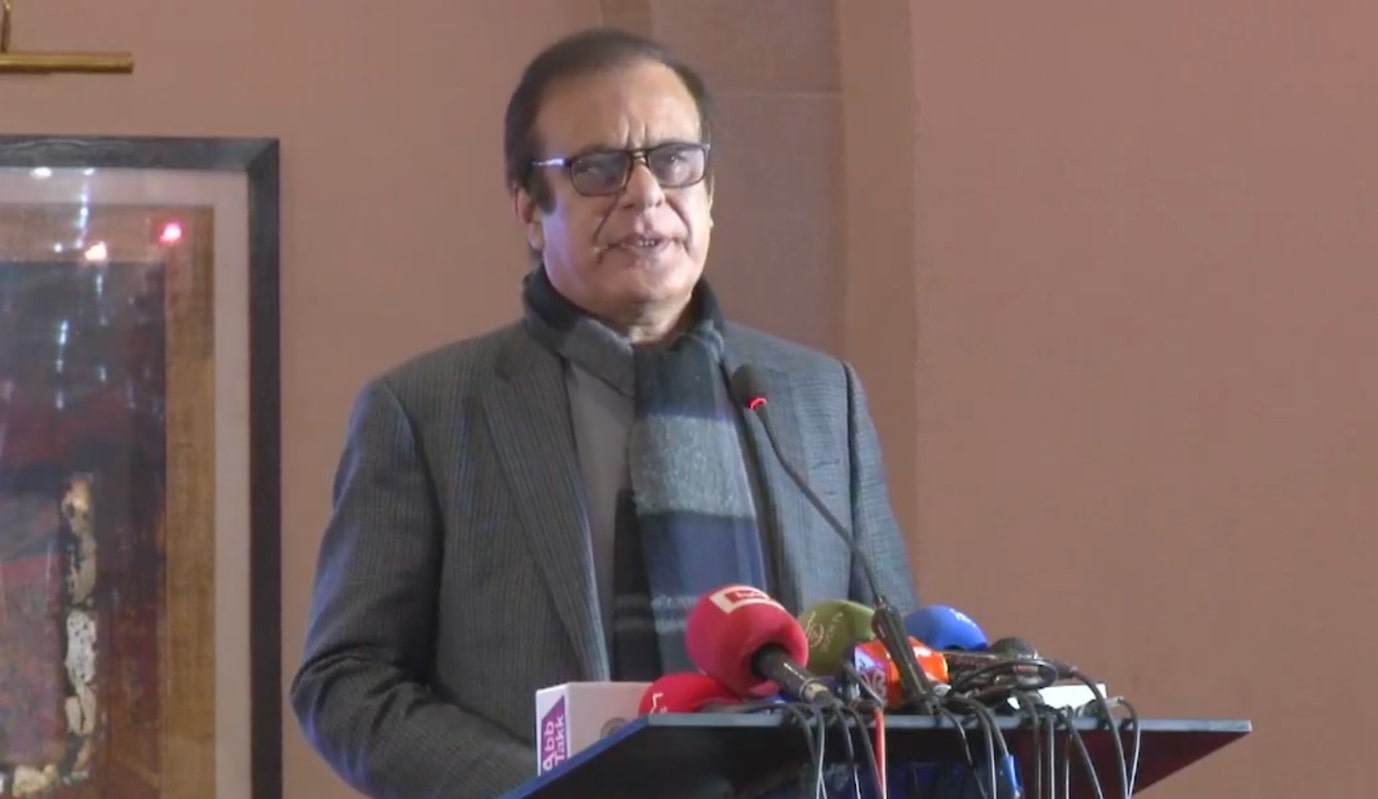
Pakistani Ambassador to the United States of America Masood Khan took the stage to deliver a few brief remarks on the event and the future of blockchain technology in Pakistan.
Khan began by thanking the hosts of the Pakistan Blockchain Summit 2022 and highlighted several other technology events set to take place in the country this year.
‘As we all know, blockchain is part of an emerging technology cascade, and it works in tandem with artificial intelligence, IoT, machine learning, cloud computing, collaborative robotics and quantum computing.’
He added that the debut Blockchain Summit has raised awareness about emerging technology and has functioned as a crash course on blockchain literacy.
Following Khan’s address, Azfar Ahsan, Minister of State and Chairman of the Government of Pakistan’s Board of Investment, thanked the hosts and attendees for delivering an edifying and insightful day and gave a few brief remarks on the event.
‘From personal computing to the dawn of the Internet and the evolution of mobile devices, technology has reshaped the world we live in. Today, new transformational technologies – IoT, AI and blockchain – are poised to change every aspect of our lives.’
He noted the effects these technologies are having on the world of business and the rapid changes they are making in the world of finance, which provides an opportunity to make rapid improvements in efficiency across both enterprise and government.
Jimmy Nguyen also delivered a brief closing statement, speaking about the importance of change and how blockchain can deliver rapid, disruptive progress that could revolutionise the way people do business, the way governments manage their citizens and the way people live.
He walked the audience through a brief history of blockchain and how the concept of time is crucial to the design of blockchain as a distributed timestamp server before looking back at the highlights of the event and the BSV Blockchain Association’s delegation in Pakistan, including meeting His Excellency Dr Arif Alvi, President of Pakistan.
The Pakistan Blockchain Summit 2022 ended with an address by Senator Shibli Faraz, Federal Minister for Science and Technology, who thanked all the parties involved in creating Pakistan’s first ever blockchain summit.
‘I would like to commend Arzish Arzam and appreciate the international delegation of BSV Blockchain, who have travelled from six countries to promote blockchain technology in Pakistan.’
‘I would like to close by thanking all of you in the audience to help build a better Pakistan; the team for organising a great event; our special guest this evening, Jimmy Nguyen, Founding President at BSV Blockchain Association, and your whole international group; Masood Khan, Pakistani Ambassador to the US; and Azfar Ahsan, Minister of State and Chairman of the Government of Pakistan’s Board of Investment.’
